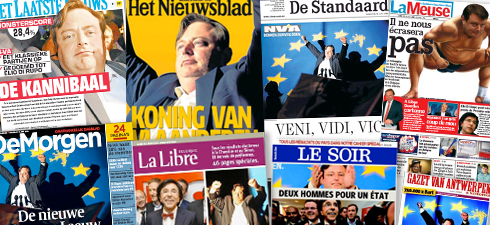The Flemish press unanimously hails the "historic" victory of Bart De Wever's Flemish nationalist N-VA. In just ten years, the movement has gone from strength to strength, and is now the leading political force in the country with 27 of the 150 seats in the lower house of parliament. In Francophone areas, the PS (Socialist party) was the main winner with 26 seats, and the socialists are now the leading political group in parliament with a total of 39 seats. It is on this basis that Di Rupo will probably become the first socialist prime minister to take office in the country since 1974.
Reform or more stagnation
Headlining with "Belgium is two countries," La Libre Belgique reports on the widening political divide with "De Wever, the champion of Flanders" on one side, and "future prime minister Di Rupo" on the other. Le Soir also highlights the threat to national unity with a front page split between De Wever and Di Rupo: "two men for one state." Most of the Flemish press enthusiastically welcomes the progress made by the leader of the NV-A. For De Morgen, Bart De Wever "has succeeded in leading Flemish nationalism into the fold of democratic politics, and in so doing has inflicted a humiliating defeat on the right-wing Vlaams Belang — an achievement which in itself merits our respect."
According to the Flemish daily, De Wever now has to contend with the "enormous responsibility of an extremely difficult choice. Either he will attempt to honour his campaign promise to establish a parliamentary majority in favour of a major reform of the state and the partition of Bruxelles-Hal-Vilvorde [the bi-lingual constituency which has become the major bone of contention between the country's Francophone and Flemish communities], or he will deliberately allow the situation to degenerate: a strategy, which will involve a few weeks of dithering, followed by the announcement that nothing can be achieved with these Francophones, and the obstruction of parliament."
De Wever does not have mandate to split country
However, "the question of what Bart De Wever wants himself still remains unanswered." What is certain, remarks De Standaard, is that "a very significant proportion of the Flemish population has lost confidence in the shaky executive in Brussels, and wants to see a major reform of the state." The newspaper calls for cooperation between the election's two main winners, which is crucial to the future of the state. "There is no alternative to a marriage of convenience between Elio Di Rupo and Bart De Wever" — not unless you consider allowing "Flanders, Brussels and Wallonia sinking further into political stagnation" to be a viable option. Pressure from the Flemish electorate should not lead us to neglect the economy, warns Het Nieuwsblad, which highlights the issue of public spending and "Europe's demands for greater budgetary discipline."
"Flemish voters who turned out in support of Bart De Wever and put him in a position of power have not given him a mandate to divide the country in two – at least not immediately – or to announce the independence of Flanders. But they are demanding that the Francophone community and the traditional Flemish parties acknowledge their desire for major reforms and more regionalisation," affirms Le Soir. The Brussels daily insists that the result of the 13 June vote offers "an immense opportunity" to break the current political deadlock "because the two real holders of power in each of the two communities are now on the move. The clash between two political forces that have been given an unequivocal mandate by voters and truly represent their communities will be marked by wholly opposed political views, but it will also represent an opportunity to define a far reaching agreement. The question is will our representatives have the necessary political courage?"
A major game-changer
Le Soir points out "that De Wever should accept a logic that will ultimately serve to save Belgium, while Di Rupo will have to acknowledge the rational for the further dismantling of the country. The fate of Belgium now rests in the hands of both these men." Will they be able to lead both communities to accept the necessity of institutional reforms to break the deadlock?" As La Libre Belgique notes ’"The question is: will Bart De Wever really be able to enter into negotiation with the Francophones?" And if he is: "When the time comes, will he be able to push for the compromise that will be indispensable if we are to achieve a widespread consensus?"
The socialist leaning *La Libre*'s editorial remarks on "the measured tone of Elio Di Rupo's statements," and his admission that the desire for change in the state of Belgium expressed by "a large proportion of the Flemish population" will "have to be acknowledged." "The fact that close to 50% of the Flemish electorate have voted for a secessionist party is a major game-changer," notes L'Echo. The business daily also warns of "arduous negotiations to determine the composition of a coalition government which could last several months, at a time when Belgium has to contend with economic crisis, and assume the rotating presidency of the EU."
Do you like our work?
Help multilingual European journalism to thrive, without ads or paywalls. Your one-off or regular support will keep our newsroom independent. Thank you!
















